Virginia is ranked 50th in the nation for the rate at which youth age out of foster care.
The outcomes for youth who age out of foster care are bleak:
- 1 in 4 are incarcerated within two years.
- 1 in 5 are homeless within two years.
- Only 3% will graduate college.
Because of these heartbreaking statistics, the Children’s Home Society of Virginia, in collaboration with the Better Housing Coalition, developed My Path Forward.
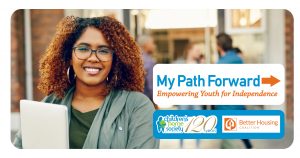 My Path Forward offers housing and high-quality, evidence-based services, settings, and policies to support this population and to empower them to become engaged and productive members of our community. Our goal is for each young adult to achieve independence and to build healthy, permanent connections to adults who will provide a lifetime of support and guidance.
My Path Forward offers housing and high-quality, evidence-based services, settings, and policies to support this population and to empower them to become engaged and productive members of our community. Our goal is for each young adult to achieve independence and to build healthy, permanent connections to adults who will provide a lifetime of support and guidance.
My Path Forward has amazing outcomes, but in order to help change Virginia’s ranking and the number of youth aging out each year, we need systemic change.
“We knew there had to be something done at a systems level,” said Cassie Baudeán, CHSVA Policy Director.
We developed our Advocacy Program to make systemic change to better the lives of children and youth with foster care experience.
“Virginia is positioned so poorly with the number of youth we have aging out of foster care,” said Baudeán. “By implementing systemic change, ideally, we wouldn’t need a program helping aged-out youth because no youth would be aging out of foster care. We want to serve our clients the best we can, but we also want to address systemic changes so our clients aren’t in these situations to begin with.”
Keep reading to learn more about our Advocacy Program, including policy changes we have achieved over the years, hurdles we still face, and how you can make a difference in the lives of children with foster care experience.
*All quotes come from Cassie Baudeán, CHSVA Policy Director
About Cassie Cunningham | Children’s Home Society of Virginia’s Policy Director
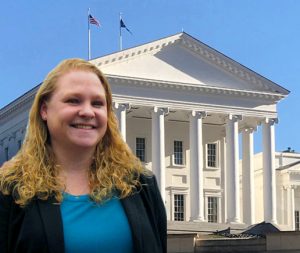 Cassie Baudeán is the Children’s Home Society of Virginia’s only full-time advocacy employee. She joined CHSVA five years ago after working as an attorney in Family Law for seven years.
Cassie Baudeán is the Children’s Home Society of Virginia’s only full-time advocacy employee. She joined CHSVA five years ago after working as an attorney in Family Law for seven years.
That is where her passion for children and youth comes from – representing children in the court system.
“The best outcome that would come from court still wasn’t necessarily a great outcome for the kids. We did the absolute best we could and got the absolute best outcome we could get, but still, no one felt great about the outcome when leaving court.”
Working in court made her realize systematic change needed to happen.
“I never felt like the people who worked on these cases didn’t want what was best for these children, we were just constrained by the system.”
Cassie quit being an attorney to start a brand-new role at CHSVA leading the Advocacy Program where she would primarily focus on policy work to change the system.
“This way, when we do get the best outcome we can, it really is the best outcome.”
By Cassie coming on board full-time, CHSVA could now join our partners at a deeper level in leading legislative and administrative policy changes.
Our Advocacy Program Today
Helping Cassie with the Advocacy Program includes CHSVA’s CEO, Nadine Marsh-Carter, social work staff, and other CHSVA Program managers.
“We have front-line workers in our agency. Everything policy-wise we manage goes through the social work team so there aren’t unintended consequences and so we know that the policies will actually be helping the population effectively.”
Our policy work is also developed with collaboration and input from our My Path Forward clients and our Post Adoption Program’s clients. Our clients are a large voice for our Advocacy Program and policy work.
“You really need to hear from the people who are impacted by the policies to know whether it will actually help and address the problem and if it’s something they will take advantage of.”
CHSVA also partners with Voices for Virginia’s Children and Virginia Poverty Law Center and other agencies in the field for our advocacy work.
Our Advocacy Program Efforts
In addition to the incarceration and homelessness statistics above:
- 70% of young women who age out of foster care are pregnant within two years.
- At age 26, only 46% of youth with foster care experience are employed compared to 80% of the general 26-year-old population.
- Furthermore, the average income for youth with foster care experience at age 26 is just under $14,000 compared to $33,000 for 26-year-olds without foster care experience.
- It costs a society an average of $300,000 for each youth who ages out of foster care over the course of their lifetime.
To change these statistics, we need real systemic change.
Our biggest foster care advocacy work happens at the Virginia General Assembly.
The General Assembly
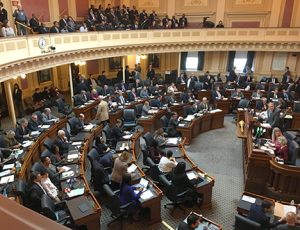 The Virginia General Assembly meets in January of every year. In even years, session is 60 days. In odd years, session is typically 46 days.
The Virginia General Assembly meets in January of every year. In even years, session is 60 days. In odd years, session is typically 46 days.
During the General Assembly, our Advocacy Program members meet with legislators from both the House and the Senate to discuss policy changes.
Voices for Virginia’s Children leads the Foster Care Unified Policy Network, which is comprised of 25-30 agencies (including us) who represent policy advocates, service providers, parents and caregivers, and—most especially—youth to identify key legislative opportunities to improve Virginia’s child welfare system.
The Network meets a few times in the fall and once or twice in the spring to identify what our priorities are going to be for each General Assembly session. We also vet through the policy agenda, which is very beneficial when we go to the General Assembly because legislation knows all of the stakeholders are on board with the recommended policy changes.
During the General Assembly session and throughout the year, we also invite families, youth, and social workers to talk to these legislators as well. The biggest time we bring down youth and social workers to talk with legislators is during Advocacy Day.
Advocacy Day
During Advocacy Day, we coordinate with families and have several meetings with legislators throughout the day. We break up into groups and each group meets with two or three legislators.
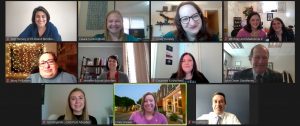 This year’s Advocacy Day was a huge success, despite being virtual. Typically, families and youth have to take a full day off of work or school. Because it was virtual, families and youth could join three or four fifteen-minute meetings without having to take off from work or school. Having a virtual option increased accessibility.
This year’s Advocacy Day was a huge success, despite being virtual. Typically, families and youth have to take a full day off of work or school. Because it was virtual, families and youth could join three or four fifteen-minute meetings without having to take off from work or school. Having a virtual option increased accessibility.
We had approximately 45 participants who joined this year, which included eight families and two adopted children. It is vital for legislators to hear from actual families who are affected.
“We have incredible legislators in Virginia. They are passionate about hearing from the families.”
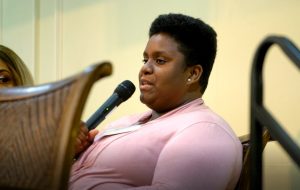
Families can make a difference. Some of the best things about Advocacy Day are building relationships and bridges between families and legislators as well as seeing youth empowered to tell their stories.
“Seeing them empowered to tell their stories is really impactful. A lot of times youth and families are surprised at how empowering it is to tell their stories.”
Some of these legislators are just like them, and foster care youth are amazed to see that.
“You’d be surprised at how many legislators have been in foster care or have experience with foster care themselves.”
General Assembly 2021
Right now during the current General Assembly, we are pushing for three main policy changes:
- Commission on Youth: The Commission on Youth would look at barriers and solutions to workforce (underemployment and unemployment) for youth who have aged out of foster care. The staff would do an in-depth study and come out with recommendations for what the barriers are and how to overcome these barriers as a state.
- Budget amendment: We want to increase local department of social services caseworker salaries to stabilize the workforce. Starting salary is only $27,000-29,000. There is also an average 50% turnover rate for caseworkers each year.
- State Kinship Care: State Kinship Care would extend support for kinship families beyond what we can currently provide. Funding is currently federal, so the federal government sets limitations. If it was state-funded, we could set our own limits and extend support to more kinship families.
Big Wins for Our Advocacy Program in the Past
We have enjoyed success with the General Assembly acting positively on many of our legislative priorities throughout the years. Some of the biggest policy changes have included:
- Foster Care Caucus: In 2019, the first-ever Foster Care Caucus was established. This caucus provides legislators an opportunity to learn about the most pressing issues in child welfare. The caucus is co-chaired by Delegate Emily Brewer (R) and Senator Monty Mason (D).
- The Office of the Children’s Ombudsman (2020): This office will provide independent oversight where individuals can file complaints of mistreatment by departments of social services for investigation. The first time this policy change was given to legislatures was in 2002, and it didn’t get passed until 2020. This bill made a lot of changes to the foster care system in Virginia, especially when dealing with caseload limits. This bill came out of a study JLARC did on our system, which identified around 30 policy recommendations to improve our system. Senator Reeves turned the study into an Ombudsman Bill that included those things.
- Family First Prevention Services Act: Hopefully this Act will go into effect this coming July (COVID impacted implementation). This Act will allow the state to access funds to provide prevention services to prevent children and youth from entering foster care in the first place.
“We have great support from all of the legislators for all of our issues. The rate at which youth age out of foster care typically isn’t at the top of people’s minds. Our legislators do a good job at keeping it top-of-mind for everyone.”
Advocacy Program Hurdles and Challenges
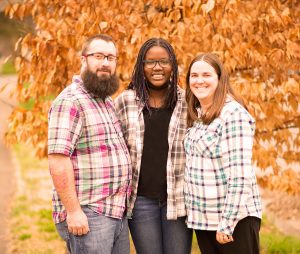 The biggest hurdle our Advocacy Program faces is funding.
The biggest hurdle our Advocacy Program faces is funding.
Anything that goes through the General Assembly that needs funding must first go through the money committees of both the Senate and the House. The goal is to get it included in the budget.
When it comes down to the budget, there is a limited amount of money. Virginia has to have a balanced budget every year. For the state level, there is X amount of money that is available.
“Budget is difficult because it’s not done in committee meetings where we can be there in person and see what the debate is. It’s done privately. That’s where we have to make a call for what our priorities are. Legislators support these changes; it’s just a matter of what we can do.”
Since COVID, funding has been even more difficult.
COVID has also made it harder to keep youth in foster care top of mind. COVID is impacting these populations, in particular youth who have aged out of foster care. However, where a lot of the rest of the population has a family to fall back on, these youth don’t. If they get COVID, these youth don’t have a family who can support them.
“The things that are affecting the general population today are hitting this population harder. Keeping foster care youth top of mind when we all are seeing everyone go through a very difficult time because of COVID has been another challenge for our Advocacy Program.”
Despite the challenges, Cassie has seen a large improvement when it comes to foster care advocacy over the years.
“These issues are becoming more and more of a priority for the General Assembly. Legislators are also understanding the issues more. It’s important to continue to raise that awareness. Education is key.”
How to Support Foster Care Advocacy
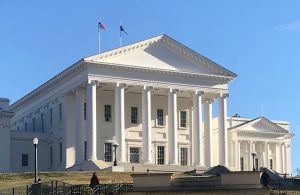 The work we do with children and families at the Children’s Home Society of Virginia is extremely important.
The work we do with children and families at the Children’s Home Society of Virginia is extremely important.
To help support our foster care advocacy work, everyone can contact their legislators! We have legislators who represent us and they have constituents. They need to hear from people they directly represent to know these issues are important to people in their district.
“In terms of making systemic change, we need to spread more awareness to the general public. As a state, we have so many youth aging out of foster care, and it’s something the general public needs to be aware of. Having more conversations will ultimately reach the people who can adopt.”
If you want to learn more about raising awareness, please reach out to Cassie for more information: 804-353-0191, ext. 334 | [email protected]
If you want to stay up-to-date on legislation relating to foster care and adoption or want to know when you could help our advocacy efforts, sign up for our advocacy blog below.
